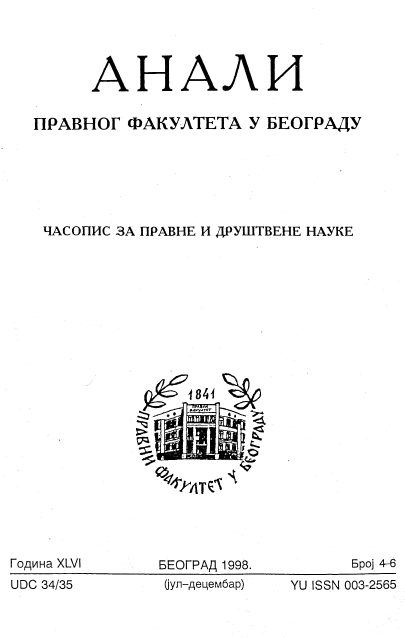ИДЕЈА РЕВОЛУЦИЈЕ И ДРЖАВА НАРОДА СРПСКОГ
THE IDEA OF REVOLUTION AND A STATE OF THE SERB PEOPLE
Author(s): Budimir KošutićSubject(s): History of Law, 19th Century
Published by: Правни факултет Универзитета у Београду
Keywords: French Revolution; State of Serbia; Yugoslavia
Summary/Abstract: At the beginning of the XIX century, the idea of revolution, be it bourgeois or socialist, had a deep influence on the resurrection of the Serbian state, its duration and development. Naturally, the influence of these qualitatively different revolutionary ideas on the statehood of the Serbian people in different periods was not of the same intensity. Namely, the ideas leading to the achievement of the French Revolution in 1789 primarily exerted a powerful influence on the resurrection of the Serbian state, i.e. they awakened the national awareness of the Serbs as a single people, scattered in two empires - the Austrian and the Ottoman empires - as well as the need for their national liberation and unification. This specific national awareness, first of all, grew among the Serbian middle class in southern Hungary at the end of the XVIII century, under the influence of the French Encyclopaedists and the western Philosophy of Enlightenment, and then it spread among the Serbs in the Ottoman Empire. France and French revolutionary ideas played a constant and manifold role in building a Serbian state, at that time. First of all, the need to create a single national state, incorporating Serbs from the Ottoman and the Austrian empires, was rooted in the ideas on which the French bourgeois revolution was founded and accomplished. However, the French Revolution is also to be credited with opening the Yugoslav dimension of the Serbian question. Namely, in creating and spreading his Illyrian province, particularly from 1809 to 1814, Napoleon endeavoured to cultivate a national awareness among Serbs (in Dalmatia) that differed from the national awareness of the Serbian insurgeants inJSerbia. The creation of the Illyrian provinces, as the first administrative community of Serbs, Croats and Slovenes under a single name, and with one national language, was intended to serve this purpose. After the end of World War I, a common state of Southern Slavs was created, based on the ideas bom in the French Revolution. This was to be a Yugoslav democratic nation-state, on the model that had come into being in England, France and the United States. From the aspect of international law, this joint state was an old state (because it was a prolongation of Serbia, recognised at the Berlin Congress of 1878), but from the viewpoint of Yugoslav constitutional law, it was a new one. Thus, Serbia ceased to exist as a separate state subject. A second, federally constituted Yugoslavia arose from the ashes of World War II, based on the principles of the socialist revolution in Russia. With the fall of the communist world and the USSR, this state disappeared and the world was again confronted with the Serbian question. Evidently, the ideas of a bourgeois-liberal revolution, contributed to the revival and successful development of the Serbian state. The ideas of the other, socialist revolution, emerged as one of the causes of the uncertainty of its future.
Journal: Анали Правног факултета у Београду
- Issue Year: 46/1998
- Issue No: 4-6
- Page Range: 325-345
- Page Count: 21
- Language: Serbian

